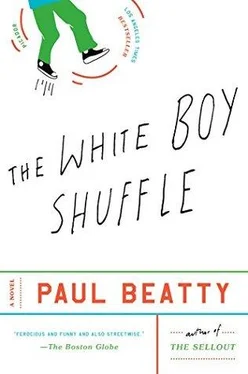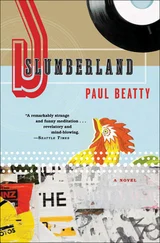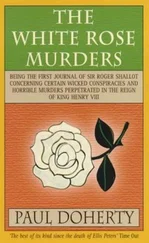Paul Beatty - The White Boy Shuffle
Здесь есть возможность читать онлайн «Paul Beatty - The White Boy Shuffle» весь текст электронной книги совершенно бесплатно (целиком полную версию без сокращений). В некоторых случаях можно слушать аудио, скачать через торрент в формате fb2 и присутствует краткое содержание. Год выпуска: 2001, Издательство: Picador, Жанр: Современная проза, на английском языке. Описание произведения, (предисловие) а так же отзывы посетителей доступны на портале библиотеки ЛибКат.
- Название:The White Boy Shuffle
- Автор:
- Издательство:Picador
- Жанр:
- Год:2001
- ISBN:нет данных
- Рейтинг книги:3 / 5. Голосов: 1
-
Избранное:Добавить в избранное
- Отзывы:
-
Ваша оценка:
- 60
- 1
- 2
- 3
- 4
- 5
The White Boy Shuffle: краткое содержание, описание и аннотация
Предлагаем к чтению аннотацию, описание, краткое содержание или предисловие (зависит от того, что написал сам автор книги «The White Boy Shuffle»). Если вы не нашли необходимую информацию о книге — напишите в комментариях, мы постараемся отыскать её.
The White Boy Shuffle — читать онлайн бесплатно полную книгу (весь текст) целиком
Ниже представлен текст книги, разбитый по страницам. Система сохранения места последней прочитанной страницы, позволяет с удобством читать онлайн бесплатно книгу «The White Boy Shuffle», без необходимости каждый раз заново искать на чём Вы остановились. Поставьте закладку, и сможете в любой момент перейти на страницу, на которой закончили чтение.
Интервал:
Закладка:
Compton Tannenberry slipped just as easily into his destined adulthood. The denizens of Mercy marveled at the contrast of his princely smooth upright blind gait to Franz von’s sighted slumped-over shuffle. In Compton’s presence the white folks could often be heard saying how he’d aged gracefully, gone from barley malt to fine scotch whisky. When Marse Compton wasn’t around, the niggers who toiled under the sun and his Confederate shogunate would say that Marse Compton hadn’t aged but curdled like stagnant milk. His white arrogance had piled and thickened, casting its sour odor wherever he went.
Sundays were for church ’n’ cards. In the afternoon Franz von sat in an unvarnished pew in the farthest corner of the Anglican Saxon Triple Baptist Church. From there he watched the good Reverend William Dern deliver sermons that alternated between damnation and salvation. Compton Tannenberry allowed no one but Franz von to shepherd him down the aisle to partake in the communion. He held Franz von tightly at the elbow while receiving the vintage spirit and the cracker body of Christ. Nights were spent in the sacrosanct parlors of the Mercy Socialite Club for Genteel Gentlemen. During the high-stakes poker games Franz von sat at Compton’s side, placing Compton’s bets for him, tapping out their secret code on Compton’s arm to let him know the cards in his hand. Compton quickly calculated his odds, and Franz von humbly reeled in the winnings from the astonished stately Tar Heel gentry. Once safely away from the gaming tables, Franz von and Compton would tell their running joke that they had the advantage because no one could read a blind man’s eyes and no one could read a nigger’s mind.
When the Civil War broke out, Compton enthusiastically went to enlist, knowing that he’d be turned away but hoping to serve the South in some capacity. As expected, the draft board told Compton he was unfit for combat, though his breeding, poker face, and guile could be used in other ways. The Confederacy asked him to be the chief negotiator in the top-secret trading of surplus bales of Southern cotton for the Union opium the Rebels desperately needed to treat their wounded. This job required Compton to take a train from Durham to Washington, D.C., every two weeks to meet with the penny-pinching Yankees. The catch was that Franz von couldn’t accompany his master on these missions, since a crafty nigra, even one as outwardly dutiful as Franz von, would be an unnecessary breach of security.
Franz von spent the first two years of his war fighting separation anxiety and faithfully awaiting the 6:15 P.M. arrival of the Hootenanny Choo-Choo from Washington, D.C. Franz von was never happier than serving as his friend’s footstool into the carriage that carried them back to the Tannenberry plantation.
Sunday, March 27, 1864. The 6:15 pulled in and Marse Compton Tannenberry’s cane never made its exploratory pokes from the first-class car. Compton’s whiny yell of “Where’s my nigger?” failed to travel down the length of the platform. Franz von waited for hours, then drove the empty buggy back to the plantation. Why won’t the Tannenberrys look him in the eye when he tells them Marse Tom wasn’t on the train? Franz von returns to the station at 6:15 the next night and every night for the rest of his life, looking every passenger that gets off the train dead in the face. No one ever had the nerve to tell Franz von that his comrade and owner died when he accidentally swallowed a piece of opium he was transporting, mistaking it for one of the sugar cubes he brought back for Old Franz von and the unrequisitioned horses.
I wish that my shameful history had stopped with pitiful Franz von, that I could say that after years of obedience my forefathers embraced the twentieth century’s waves of black pride. The seventh-graders ate quiet lunches in the school cafeteria. I told the story of Wolfgang Kaufman to the rustle of brown paper bags and the muffled crunches of mouthfuls of potato chips. Wolfgang Kaufman was my great-great-uncle who once held the highest appointed municipal position a Negro in Nashville, Tennessee, could aspire to in the 1920s, chief of the Department of Visual Segregation. With Jim Crow as his muse, he spent muggy afternoons under a splotchy painter’s cap, painting and hanging the FOR WHITES ONLY and FOR COLORED ONLY signs that hung over quasi-public places throughout Nashville. At five dollars an hour, not many Nashville blacks were doing much better, and Wolfgang took pride in his stenciled artistry. A fit of absentmindedness caused him to lose the precious contract when he was spotted exiting from the men’s room after taking a satisfying early-morning number two in the whites-only toilet. The sight of a dark black man zipping up his fly and pulling underwear from the crack of his ass was too much for any virtuous white woman, especially the one passed out in horror at his feet. Ms. O’Dwyer came to with Wolfgang hovering over her face, apologetically jabbering something about there being no toilet paper in the colored washroom. Quickly regaining her faculties and privileged sensibilities, Ms. O’Dwyer slapped Wolfgang across his pleading lips and reported him to the mayor’s office. Some benevolent civic official commuted his lynching, and soon after the nigger moved to Chicago and was polishing floors at WGN radio with a huge “Thank ya, Lawd” smile on his face.
One sunny Tuesday morning a tacky fat-and-skinny twosome barreled into the station to rehearse scenarios for a new radio show. Wolfgang briefly stopped squeegeeing the soundstage windows to listen to the duo, Freeman F. Gosden and Charles J. Correll, run through their stale repertoire. “Funny thing happened to me on the way to the station today.” Along with the station managers, Wolfgang groaned and covered his ears, remembering hearing their baritone voices when he was hightailing through New Orleans. They were good mimics, but their material was awful. Wolfgang decided to help the boys out. During a break in rehearsal, he popped his derby-topped head into the studio, removed the stubby cigar from his mouth, and suggested to the worried-looking Gosden and Correll that they join him for lunch. “Y’all gonna hear some real comedic genius.” Having nothing to lose, the white boys followed Wolfgang to the Chicago Circle Cab Company, where a group of cabbies on their lunch breaks sat inside the dispatch booth talking about each other’s shortcomings and women and telling hilarious, if only slightly exaggerated, stories of black life in a big city. The bashful peckerwoods sat dumbfounded on the fender of a broken-down cab. Neither man had ever contemplated the existence of a black society beyond elevator operators and occasional snapshots of well-to-do Negroes in the Sun-Times. Here were men talking in a myriad of dialects about a vivacious life which to most of America was invisible. The butt of most of the jokes was an understated college-educated cabdriver named Enos. The loudest and most rambunctious of the Negro storytellers was a plump unemployed dandy named Sandy. Wolfgang smiled as the similarities in physique and personality dawned on the struggling radio personalities. Wolfgang stood up and sang a slow rendition of “Carry Me Back to Ol’ Virginny,” and Gosden and Correll raced back to the station, their heads buzzing with ideas for a weekly show called Amos ’n’ Andy. Soulless white American radio was destined for droll hours of Fibber McGee and Molly till Wolfgang Kaufman shucked ’n’ jived to its rescue. America got a pair of stumbling jitterbugging icons; Wolfgang Kaufman got a ten-cent raise.
Ms. Murphy’s seventh-grade history class, still in rapt attention, unanimously voted to skip watching Eyes on the Prize so they could hear the tale of Ludwig Kaufman. Son of Wolfgang, Cousin Ludwig used his father’s tenuous mop-bucket industry connections to become a manager of white acts that ripped off the Motown rhythm-and-blues hysteria. Some of his more popular acts were Gladys White and the Waitress Tips and the Stevedores, whose melodic hit, “Three Times a Longshoreman,” made a little noise on the eastern seaboard. Ludwig was proudest of his project the Four Cops, a Los Angeles — based quartet who charted with a ballad entitled “Reach Out and I’ll Be There Hittin’ You Upside the Head with a Nightstick.”
Читать дальшеИнтервал:
Закладка:
Похожие книги на «The White Boy Shuffle»
Представляем Вашему вниманию похожие книги на «The White Boy Shuffle» списком для выбора. Мы отобрали схожую по названию и смыслу литературу в надежде предоставить читателям больше вариантов отыскать новые, интересные, ещё непрочитанные произведения.
Обсуждение, отзывы о книге «The White Boy Shuffle» и просто собственные мнения читателей. Оставьте ваши комментарии, напишите, что Вы думаете о произведении, его смысле или главных героях. Укажите что конкретно понравилось, а что нет, и почему Вы так считаете.












